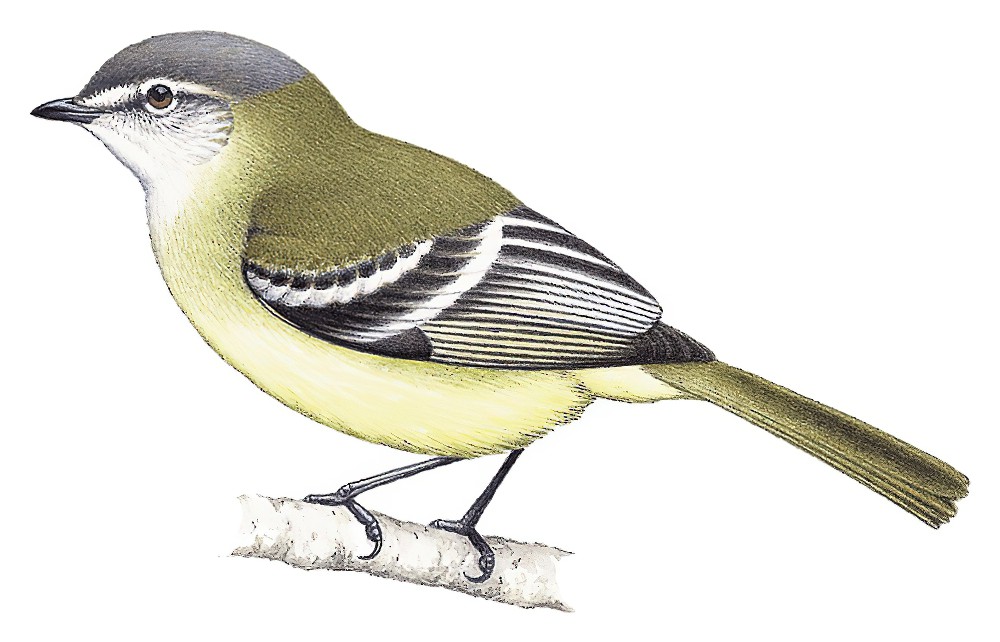Planalto Tyrannulet / Phyllomyias fasciatus

Planalto Tyrannulet
SCI Name:
Protonym: P[ipra] fasciata Mem.Acad.Imp.Sci.St.Petersb. 8 p.283,285
Taxonomy: Passeriformes / Tyrannidae / Phyllomyias
Taxonomy Code: platyr2
Type Locality: Brazil; restricted to Jaguaquara, Bahia (J. T. Z.).
Author: Thunberg
Publish Year: 1822
IUCN Status: Least Concern
DEFINITIONS
PHYLLOMYIAS
(Tyrannidae; Ϯ Planalto Tyrannulet P. fasciatus brevirostris) Gr. φυλλον phullon leaf; Mod. L. myias flycatcher < Gr. μυια muia, μυιας muias fly; πιαζω piazō to seize; "Gen. PHYLLOMYIAS *) nov. gen. — Laub-Fliegenstecher. 196. 1. P. brevirostris **) Nob. Platyrhynchus brevirostris Spix Av. Bras. II. p. 13. t. 15. 2. — Muscipeta asilus Wied Beitr. III. p. 894. — Muscicapa virescens "Natt." Temm. Pl. col. 275. 3. — Tyrannulus virescens Id. Tabl. méth. p. 27. — Muscicapa olivacea Orb. & Lafr. Syn. p. 54. 14. — Muscicapara boliviana Orb. Voy. p. 328. 244. — Myiobius asilus Gray Gen. B. I. p. 249. 68. — Elania virescens Id. l. l. p. 250. 6. — Elania olivacea Id. l. l. p. 251. 26. — Leptopogon olivaceus Bp. Consp. I. p. 186. — Muscicapa pusio Licht. in Mus. Berol. ... 197. 2. P. Burmeisteri ***) Nob. Elaenea brevirostris Burm. (nec Spix) Th. Bras. II. p. 479. ... *) Von φυλλον (Laub) und μυιας (= Muscicapa). Diese Gattung umfasst kleinere Formen von Elaïnea mit kurzem, breitem, weniger hohem Schnabel und meist olivengrünem Gefieder ohne dunklere Kappe." (Cabanis & Heine 1859); "Phyllomyias Cabanis and Heine, 1859, Mus. Heineanum, 2, p. 57. Type, by subsequent designation (Sclater, 1888, Cat. Birds Brit. Mus., 14, p. 121), "P. brevirostris" = Platyrhynchus brevirostris Spix." (Traylor in Peters 1979, VIII, 3).
Synon. Acrochordopus, Idiotriccus, Oreomyias, Oreotriccus, Tyranniscus, Xanthomyias.
fasciatum / fasciatus
Late L. fasciatus banded < L. fascia band, stripe.
● ex “Calao Longibande” of Levaillant 1807, pl. 233 (Lophoceros).
● ex “Gobe-mouche à poitrine tachetée de Cayenne” of d’Aubenton 1765-1781, pl. 574, fig. 3 (Myiophobus).
● ex “Ynambuí” of de Azara 1802-1805, no. 327 (syn. Nothura maculosa).
● ex “Merle des Moluques” of d’Aubenton 1765-1781, pl. 257 (syn. Pitta moluccensis).
● ex “Gélinotte des Indes” of Sonnerat 1782 (syn. Pterocles indicus).
SUBSPECIES
Planalto Tyrannulet (cearae)
SCI Name: Phyllomyias fasciatus cearae
cearae / cearensis
Ceará, Brazil.
Planalto Tyrannulet (fasciatus)
SCI Name: Phyllomyias fasciatus fasciatus
fasciatum / fasciatus
Late L. fasciatus banded < L. fascia band, stripe.
● ex “Calao Longibande” of Levaillant 1807, pl. 233 (Lophoceros).
● ex “Gobe-mouche à poitrine tachetée de Cayenne” of d’Aubenton 1765-1781, pl. 574, fig. 3 (Myiophobus).
● ex “Ynambuí” of de Azara 1802-1805, no. 327 (syn. Nothura maculosa).
● ex “Merle des Moluques” of d’Aubenton 1765-1781, pl. 257 (syn. Pitta moluccensis).
● ex “Gélinotte des Indes” of Sonnerat 1782 (syn. Pterocles indicus).
Planalto Tyrannulet (brevirostris)
SCI Name: Phyllomyias fasciatus brevirostris
brevirostre / brevirostris
Mod. L. brevirostris having a short beak < L. brevis short; -rostris -billed < rostrum beak.
UPPERCASE: current genus
Uppercase first letter: generic synonym
● and ● See: generic homonyms
lowercase: species and subspecies
●: early names, variants, mispellings
‡: extinct
†: type species
Gr.: ancient Greek
L.: Latin
<: derived from
syn: synonym of
/: separates historical and modern geographic names
ex: based on
TL: type locality
OD: original diagnosis (genus) or original description (species)












